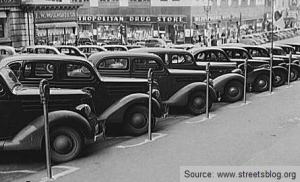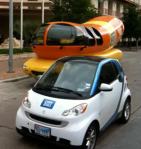Put off reading this article.
--> Read on:
Insights and contributions from leading thinkers & practitioners around the world
. . . and not allow oneself to get caught in every political elephant trap and querulous carping of those not in office. But there are  times when it is necessary to shine the spotlight on a really mean-spirited, disingenuous idea or statement about the important matters which bring us all here. This is one of those cases. We introduce you to a very short video in which Britain's new transport secretary talks very clearly about his investment priorities and intended policies. Very disturbing to World Streets.
times when it is necessary to shine the spotlight on a really mean-spirited, disingenuous idea or statement about the important matters which bring us all here. This is one of those cases. We introduce you to a very short video in which Britain's new transport secretary talks very clearly about his investment priorities and intended policies. Very disturbing to World Streets.
 This latest country survey from Sweden provides and update and excellent coverage of the carshare situation there, thanks to Per Schillander of the SRA. More than 18,000 registered drivers, almost 60 different programs, and at last count 573 vehicles. You will want to read this in parallel with his comprehensive report from last winter: Car Sharing in Sweden in 2010
This latest country survey from Sweden provides and update and excellent coverage of the carshare situation there, thanks to Per Schillander of the SRA. More than 18,000 registered drivers, almost 60 different programs, and at last count 573 vehicles. You will want to read this in parallel with his comprehensive report from last winter: Car Sharing in Sweden in 2010
One week exactly before India Streets opens for the public, we are pleased to share this preview with you on some transport/land use issues that will look familiar to many in many parts of the world.
--> Read on:
Mumbai is currently undergoing historic but unnoticed changes that might possibly alter its urban structure beyond anyone’s imagination. It’s monocentric structure that aligned the entire city towards the downtown in South Bombay is likely to change very soon. Indeed, this process has already begun. I used to live in Navi Mumbai in 2009, and I would sometimes take the harbour line train to south Bombay. Each time, I would notice that the majority … Read More
This is the first shared posting from India Streets, a sister program to W/S that is to open for publication on 1 November. At this point the site is still in Beta. Your visits and comments for improvement are most welcome.
"If you think the NATO oil tankers have a rough time in Pakistan, spare a thought for the masses which use the local transport system. The manner in which buses, rickshaws and strange articulated three-wheelers ply on our roads makes it obvious that there is nothing really ‘public’ about public transport anymore. We have instead condemned the majority of the population, many of whom are poor, women and elderly, to a veritable shakedown staged by … Read More
 This article by Tom Vanderbilt appeared in yesterday's Wired offering a readable review of the history of this remarkable American transportation invention and gift to the world, with good references to Donald Shoup's monumental "The High Cost of Free Parking" and Paul Barter's Reinventing Parking blog. Every regular reader of World Streets is well aware that strategic parking control is one of the key pillars to a city transport system that is doing its job -- but whether or not the key to this is going to be the old parking meter, well that we can leave you to judge.
This article by Tom Vanderbilt appeared in yesterday's Wired offering a readable review of the history of this remarkable American transportation invention and gift to the world, with good references to Donald Shoup's monumental "The High Cost of Free Parking" and Paul Barter's Reinventing Parking blog. Every regular reader of World Streets is well aware that strategic parking control is one of the key pillars to a city transport system that is doing its job -- but whether or not the key to this is going to be the old parking meter, well that we can leave you to judge.
"When it comes to transport, we've become obese. I mean this in multiple senses. Our  population of vehicles has burgeoned; already around 1 billion worldwide, it’s expected to double within just 20 years. The vehicle miles we travel, or VMT, continue to swell; just in the U.S., for instance, VMT now fluctuates around 250 billion per month – trillions per year – and grows each month by an average 200 million more. Even our waistlines have expanded due to excess motor vehicle travel; one study attributes six extra pounds to the extra driving done by typical suburbanites."
population of vehicles has burgeoned; already around 1 billion worldwide, it’s expected to double within just 20 years. The vehicle miles we travel, or VMT, continue to swell; just in the U.S., for instance, VMT now fluctuates around 250 billion per month – trillions per year – and grows each month by an average 200 million more. Even our waistlines have expanded due to excess motor vehicle travel; one study attributes six extra pounds to the extra driving done by typical suburbanites."
One of the persistent themes of World Streets is that both the starting and the ending  place for what is often called "transportation" or "infrastructure" are not about concrete, steel or rubber, nor infrastructure, vehicles or even electronics, but people -- ordinary people like you and me in our day-to-day lives. Here in a short piece by the behavioral economist Robert Frank that appeared in Saturday's New York Times is a single paragraph (toward the bottom and conveniently in red here) which provides us with one more trenchant reminder that reminds us of the importance of starting with people. And the high cost of tailing to do just that.
place for what is often called "transportation" or "infrastructure" are not about concrete, steel or rubber, nor infrastructure, vehicles or even electronics, but people -- ordinary people like you and me in our day-to-day lives. Here in a short piece by the behavioral economist Robert Frank that appeared in Saturday's New York Times is a single paragraph (toward the bottom and conveniently in red here) which provides us with one more trenchant reminder that reminds us of the importance of starting with people. And the high cost of tailing to do just that.
 This commentary, just in from reader John Verity writing from Sonoma County, north of San Francisco, takes Illich beyond his original point of departure in this essay written in 1974, discussing the flow of his thinking on energy and technology that appeared in other pages and books in the decade that followed.
This commentary, just in from reader John Verity writing from Sonoma County, north of San Francisco, takes Illich beyond his original point of departure in this essay written in 1974, discussing the flow of his thinking on energy and technology that appeared in other pages and books in the decade that followed.
 ner to our international readers on the work and accomplishments, and hopes and plans, of outstanding groups, projects and programs in various corners of the world leading the way in face of the tough challenges in our chosen sector -- looking for exemplary approaches and tools that have potential for very broad, hopefully universal application.
--> Read on:
ner to our international readers on the work and accomplishments, and hopes and plans, of outstanding groups, projects and programs in various corners of the world leading the way in face of the tough challenges in our chosen sector -- looking for exemplary approaches and tools that have potential for very broad, hopefully universal application.
--> Read on:
 In the wake of the sheer madness, no that's too kind, outright stupidity, flagrant self-satisfaction and puerile cuteness of yesterday's "Why Leftists want to pull you all on mass transit" piece, we offer you some brief words of respite taken directly from Paul Krugman's 7 October piece in his "The Conscience of a Liberal" blog from the New York Times. Our bottom line: Don't give up on America yet. We may be in the slow lane, but with a lot more hard work and hard thinking we just may get there yet.
In the wake of the sheer madness, no that's too kind, outright stupidity, flagrant self-satisfaction and puerile cuteness of yesterday's "Why Leftists want to pull you all on mass transit" piece, we offer you some brief words of respite taken directly from Paul Krugman's 7 October piece in his "The Conscience of a Liberal" blog from the New York Times. Our bottom line: Don't give up on America yet. We may be in the slow lane, but with a lot more hard work and hard thinking we just may get there yet.
Fresh from America's Fox News ("fair and balanced" is their motto), this article will provide  our readers with a clue as to how the present electorial shenanigans are generating wisdom and expert comments on "best practices" when it comes to transport in cities. And if you should wish to check the public reaction to the author's stated position, you can fill up your tank by reading the Comments here.
our readers with a clue as to how the present electorial shenanigans are generating wisdom and expert comments on "best practices" when it comes to transport in cities. And if you should wish to check the public reaction to the author's stated position, you can fill up your tank by reading the Comments here.
"Peer-to-peer carsharing" (P2P C/S) sounded to me for quite some time like a new mobility concept that was unlikely to go very far. The idea that, instead of a perfectly functional car rental service or a local carshare operation fo r people who might need a car for a bit, there might also be a niche in the market for people willing to share their own cars on a regular basis with others (for the most part strangers!), sounded to me at least like a well-intentioned 1970's peace-and-love idea warmed over. But . . . I have of late been talking to some people who are more open in their thinking about P2P than I am/was -- including several who are actually trying to make it work. So I am beginning to revise my thoughts. In a very big way, in fact. Let's follow this thread together.
r people who might need a car for a bit, there might also be a niche in the market for people willing to share their own cars on a regular basis with others (for the most part strangers!), sounded to me at least like a well-intentioned 1970's peace-and-love idea warmed over. But . . . I have of late been talking to some people who are more open in their thinking about P2P than I am/was -- including several who are actually trying to make it work. So I am beginning to revise my thoughts. In a very big way, in fact. Let's follow this thread together.
 Dave Brook writes about innovation in the tricky concept of one-way carsharing in the US in his fine blog Carsharing.US on this date: "Free is a very good price if you want to get people to try your product! And free certainly helped Daimler's innovative car2go personal mobility service in Austin, Texas, to 10,000 members in less than a year. "
Dave Brook writes about innovation in the tricky concept of one-way carsharing in the US in his fine blog Carsharing.US on this date: "Free is a very good price if you want to get people to try your product! And free certainly helped Daimler's innovative car2go personal mobility service in Austin, Texas, to 10,000 members in less than a year. "
 This article appeared today in the Sierra Club's series by their chairman Carl Pope, "Taking the initiative". It is interesting to see how an American who has lived and worked in India in his youth sees the two models.
This article appeared today in the Sierra Club's series by their chairman Carl Pope, "Taking the initiative". It is interesting to see how an American who has lived and worked in India in his youth sees the two models.
 The World Bank recently published a report, “Technical and Operational Challenges to Inclusive Bus Rapid Transit,” compiled by Tom Rickert, a consultant with extensive experience on accessible transportation. While the technical report is intended primarily for an audience of BRT system and service planners, its release marks a recognition of the practical challenges in making public transport in the developing world fully accessible.
The World Bank recently published a report, “Technical and Operational Challenges to Inclusive Bus Rapid Transit,” compiled by Tom Rickert, a consultant with extensive experience on accessible transportation. While the technical report is intended primarily for an audience of BRT system and service planners, its release marks a recognition of the practical challenges in making public transport in the developing world fully accessible.
Over these last weeks given the news and fuss that has been generated by the press as India for better or worse  prepares the way for the Commonwealth Games, it was not surprising that our minds ran to another great divide: that between the reality of the transport situation and priorities in India's cities and streets -- and the views and choices of let's call it "Official India" in the face of these issues and decisions. There is, no doubt about it, a clear and common pattern. We kept thinking about the many parallels, so when our friend Karthik Rao-Cavale took on this challenge whole cloth in the blog "India lives in her cities too!" we were impressed by his analysis of the situation and are pleased to bring it to your attention here.
prepares the way for the Commonwealth Games, it was not surprising that our minds ran to another great divide: that between the reality of the transport situation and priorities in India's cities and streets -- and the views and choices of let's call it "Official India" in the face of these issues and decisions. There is, no doubt about it, a clear and common pattern. We kept thinking about the many parallels, so when our friend Karthik Rao-Cavale took on this challenge whole cloth in the blog "India lives in her cities too!" we were impressed by his analysis of the situation and are pleased to bring it to your attention here.
Squatter settlements being hidden by Commonwealth Games boards (source: India Together) The past week has been brutal for Delhi's Commonwealth Games, which is due to begin in a few days. BBC reported poor living facilities and unhygienic restrooms. Time.com ridiculed Delhi's use of langurs (larger Indian monkeys) to drive away smaller monkeys. An Australian channel carried out a false "sting operation" that was supposed to expose security lapses. … Read More